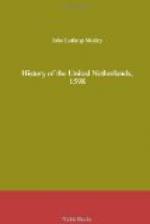The king then feebly begged those about his bedside to repeat the dying words of our Saviour on the cross, in order that he might hear them and repeat them in his heart as his soul was taking flight.
His father’s crucifix was placed in his hands, and he said distinctly, “I die like a good Catholic, in faith and obedience to the holy Roman Church.” Soon after these last words had been spoken, a paroxysm, followed by faintness, came over him, and he lay entirely still.
They had covered his face with a cloth, thinking that he had already expired, when he suddenly started, with great energy, opened his eyes, seized the crucifix again from the hand of Don Fernando de Toledo, kissed it, and fell back again into agony.
The archbishop and the other priests expressed the opinion that he must have had, not a paroxysm, but a celestial vision, for human powers would not have enabled him to arouse himself so quickly and so vigorously as he had done at that crisis.
He did not speak again, but lay unconsciously dying for some hours, and breathed his last at five in the morning of Sunday the 13th September.
His obsequies were celebrated according to the directions which he had so minutely given.
------------------------------------
These volumes will have been written in vain if it be now necessary to recal to my readers the leading events in the history of the man who had thus left the world where, almost invisible himself, he had so long played a leading part. It may not be entirely useless, however, to throw a parting glance at a character which it has been one of the main objects of this work, throughout its whole course, to pourtray. My theme has been the reign of Philip II., because, as the less is included in the greater, the whole of that reign, with the exception of a few episodes, is included in the vast movement out of which the Republic of the United Netherlands was born and the assailed independence of France and England consolidated. The result of Philip’s efforts to establish a universal monarchy was to hasten the decline of the empire which he had inherited, by aggravating the evils which had long made that downfall inevitable.
It is from no abstract hatred to monarchy that I have dwelt with emphasis upon the crimes of this king, and upon the vices of the despotic system, as illustrated during his lifetime. It is not probable that the military, monarchical system—founded upon conquests achieved by barbarians and pirates of a distant epoch over an effete civilization and over antique institutions of intolerable profligacy—will soon come to an end in the older world. And it is the business of Europeans so to deal with the institutions of their inheritance or their choice as to ensure their steady melioration and to provide for the highest interests of the people. It matters comparatively little by what name a government is called, so long as the intellectual and moral development




